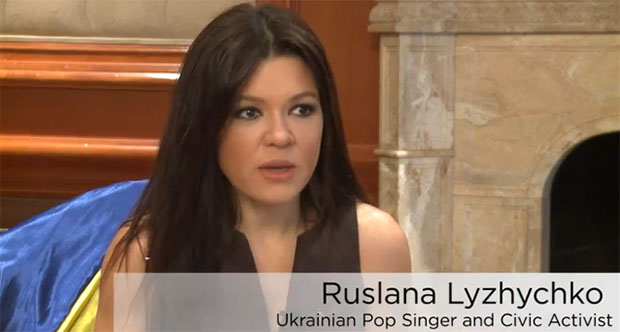 Ruslana Lyzhychko, a recipient of this year’s Atlantic Council Distinguished Humanitarian Leadership Award, is the most recognized public face of the Ukrainian revolution known as “Maidan.” This Turkic word for square (as in Maidan Nezalezhnosti, Independence Square) has become a synonym for the new democratic awareness and activism that Ruslana believes have turned Ukraine into a different country.
Ruslana Lyzhychko, a recipient of this year’s Atlantic Council Distinguished Humanitarian Leadership Award, is the most recognized public face of the Ukrainian revolution known as “Maidan.” This Turkic word for square (as in Maidan Nezalezhnosti, Independence Square) has become a synonym for the new democratic awareness and activism that Ruslana believes have turned Ukraine into a different country.
Ruslana is the Madonna of Ukraine, its most famous pop star. The child of a Russian mother and a Ukrainian father, Ruslana remembers her childhood as an endless discussion between her parents as to what culture she should be raised in, she said in an interview. Born in the western Ukrainian city of Lviv, Ruslana’s bi-national world eventually took a decisive turn when at the age of seven, her parents divorced, and she remained in Ukraine.
The first thing you notice about Ruslana is how petite she is. But Ruslana is a dynamo whose energy and focus has earned her a place in Ukraine’s history books. As the pro-democracy demonstrations in Kyiv gained momentum, as the tragic deaths of over 100 people at the hands of snipers who have yet to be fully identified and prosecuted played out on the country’s television and computer screens, sadness and apprehension gripped the thousands who braved long cold days and even longer, colder nights on the Maidan. To cure their pain and anger, Ruslana sang the Ukrainian national anthem over 500 times. The song became her song and the place where she sang it, the Maidan, became a spiritual space that channelled energy and protected all that is bright and good, she says.
The romance of the Maidan was cut brutally short, not only for Ruslana, but for all Ukrainians who felt that the protests had truly changed their country and heralded a better, freer and more democratic future. Russia’s annexation of Crimea, followed by the militant incursion and violence in the east and the south of the country destroy not only what legacy the Maidan has created, but the territorial integrity of the entire country. Having performed all over Ukraine and many times in eastern Ukraine, Ruslana admits that she was shocked and completely surprised by the events that unfolded there. She believes that only one man is responsible for the chaos that is being sown there, and that man is Vladimir Putin. No Putin, no chaos, she says.
Ruslana recalls how people in Luhansk sang along with her during her concerts, repeating refrains from ancient Ukrainian folk songs. We were all together then, united in our love of Ukrainian music, now we are united again, waiting for Putin’s tanks, she says.
Ruslana has not only been a singer and inspiring performer, she is also the UNICEF goodwill ambassador in Ukraine. And she may not admit it openly, but she is a politician, the unofficial spokeswoman of a cause and a movement. In 2006 Ruslana was elected to parliament on the Our Ukraine party ticket of former president Viktor Yushchenko. The parliament was disbanded after only a year. That was enough for Ruslana to realize that her calling is not politics and that her talent and energy are better placed in doing exactly what she is doing now, raising people’s spirits and perpetuating the energy of the Maidan.
Perhaps she was a better politician than she gives herself credit. The problem she foresaw and attempted to solve in 2006, Ukraine’s energy dependence on Russia, is a problem that not only hasn’t gone away, but has grown in magnitude.
